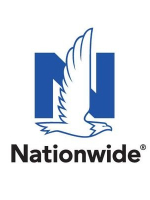12/05/2023 — Key takeaways:
- Business owners are still reeling from the impacts of COVID-19 and are now facing economic headwinds.
- Attracting and retaining top talent is a challenge in a tight labor market.
- As a financial professional, now is a great time to be talking with business-owner clients about adding policies such as corporate-owned life insurance (COLI) into their financial plans.
Nationwide’s 2023 Economic Impact survey found that just 39% of mid-market business owners rate business conditions in the US economy positively, down 19 points since September 2022. They’re also struggling to retain workers, with 51% of mid-market businesses saying a tight and scarce labor market has had a negative impact on their business in the past six months, and 17% saying their ability to attract and retain good employees will be their biggest business challenge in the next six months.1
Business owners are worried
Historically, when the economy takes a turn for the worse, quit rates tend to drop, as they did during the 2008 recession and at the start of the pandemic. Although many assumed inflation and recession fears would bring resignation levels back to pre-pandemic numbers, those factors seem to be inspiring more workers to switch jobs. According to a recent Bankrate survey, those who are most concerned about job security in this economy are also more likely to demand a raise, greater flexibility, search for a new job or quit.2
Losing valued employees can also be costly. Replacing a high-level employee can cost up to 400% of the departing executive’s annual salary, according to the business publication Inc.3 Though worrisome to your business-owner clients, these circumstances present an opportunity for you as a financial professional. You can suggest solutions that they may not have considered or even known about, such as COLI.
Corporate-owned life insurance policies can help
COLI policies are a way for companies to informally finance employee benefits, minimize tax burdens and increase after-tax net income. They are taken out on critical employees, with companies paying the insurance premiums and receiving the death benefit if a covered employee passes away.
A common use of COLI policies is to help employers meet obligations arising from non-qualified deferred compensation (NDQC) plans. When a company makes a promise of future compensation to key employees, this promise can create a liability that can grow over time.
- For example, a company might offer 100 executives the ability to defer a part of their income until their retirement and then offer to match a portion or all of that deferral
- This obligation becomes a liability as the company needs to ensure they can make these future payments
While companies might set aside cash, securities or hard assets, the most tax-efficient informal funding tool is cash value life insurance policies such as COLI. Because the cash value of the policies equals or nearly equals the cash paid in premiums, there is no immediate change to the company’s balance sheet. COLI policies also provide added reassurance for executives that the company has secured their deferred income.
Retain and attract highly compensated employees
An NQDC plan funded with COLI offers benefits to employees, too. Here are two of the top reasons:
Tax advantages: When highly compensated employees defer receiving income, they also defer paying federal and state taxes on that income until it’s paid out to them. This can be especially appealing if they’re currently in a high tax bracket and expect to be in a lower tax bracket in the future — reducing their present taxable income and scheduling their distributions to arrive in lower tax bracket years.
Unlimited contributions: Since NQDC plans aren’t subject to ERISA standards, there’s no cap on their contribution amount. Traditional retirement plans and accounts can be insufficient for helping highly compensated employees adequately save for retirement.

